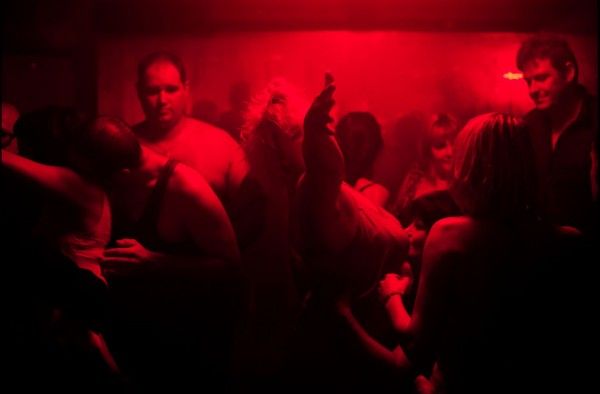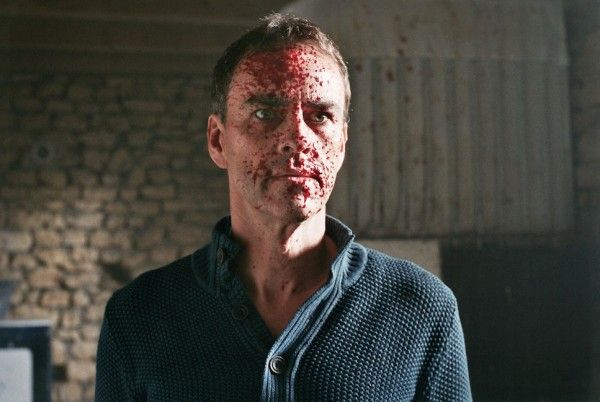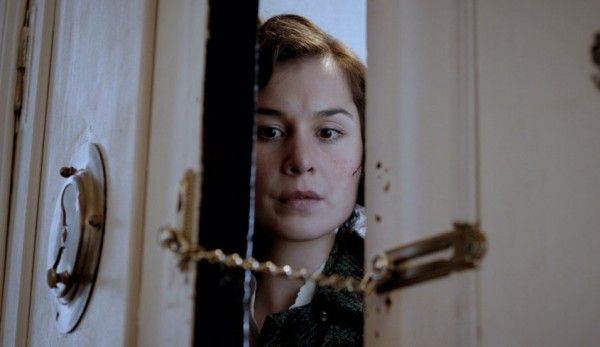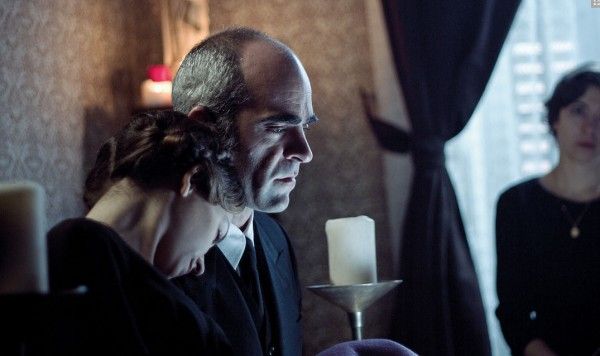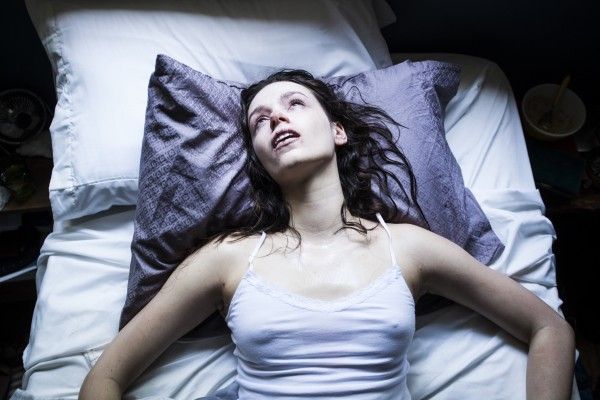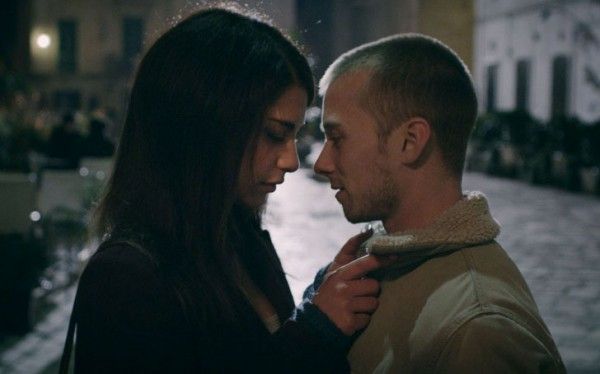This weekend, three out of the four films presented in the official competition at the Paris International Film Festival were directed by a duo, and each feature offers a unique look at the theme of love where the eerie protagonists are all female. Oscillating between passion and obsession, their Delphic climax invite the spectator's conclusion. Or imagination.
Presented in the official selection of the Directors’ Fortnight at this year’s Cannes Film Festival, the Franco-Belgian production Alleluia, directed by Fabrice Du Welz, takes on an odyssey of crime and passion in a psychological thriller based loosely on the story of the notorious Honeymoon Killers, Martha Beck and Raymond Fernandez, a young nurse and confidence trickster who went on a rampage in the late 1940s.
“Show me your shoes and I’ll tell you who you are.” Michel (Laurent Lucas) is a shoe salesman who claims he provides a public service to his customers. “Je les aide à trouver chaussure à leurs pieds,” a French expression meaning, “I help them find the right partner.” Except that he’s not a shoe salesman but a widow scammer … with a fetish for shoes. He operates as a gigolo, as his blind date Gloria (Lola Dueñas), whom he meets through a dating site, is about to discover. Sparks fly during their lunch and the single mom, who works in a morgue washing the dead, falls for Michel after a one-night stand. And she falls hard for his blue-eyed dreamy gaze, dangerously in love, as if all common sense was knocked out of her during this fall. But Michel, after embezzling some money out of her the next morning, disappears.
Obsessed, she manages to track him down and, desperate as she is to claim this man as her own, accepts to assist him in entrapping rich ladies by pretending to be his sister. Needy and perhaps finally finding something to escape her dreary life, she leaves her young daughter with a friend to travel with Michel on their road to riches. But her willingness to assist quickly subsides as she grows uncomfortable with him sleeping with other women, including his new rich wife, and her jealousy begins to border on insanity. One night after making a scene, he tells her, “I’m working, I have to f*ck them.” Just like he f*cked her the first time. He sees her as the mother figure he never had: caring and nurturing; she sees him as the ideal man. He’s all about the money and obsessed with Bogart, she’s tormented with the idea of possessing him and will not let any other woman come between them. And she proves just how she is used to handling the dead … As Gloria’s jealousy escalates by the minute and her passion leads to crime, we question who is really crazier and begin to wonder what really happened to Gloria’s husband for his face is scraped off of every photo in her album. A warning sign Michel should have taken into account. Not that he's any less deranged.
French actor Lucas is used to playing borderline roles and strikes a balance between the charmer and the man whose upbringing has ruffled him. (His mother sexually abusing him when no other man was available.). We notice Michel’s not quite normal the night before the big date. Like many of Du Welz’s characters, he partakes in a religious ritual to cope with a void left by his childhood trauma and a need to please at all costs. And as he burns Gloria’s photo on a candle, he prays that she like him, not realizing his supplication will be answered in more ways than he bargained for, more than the mother figure he unconsciously seeks. A classic narcissist, the world orbits around him. When she kills a rich old woman that he was about to seduce, Michel, suffering from one of his migraines, sits in a corner screaming, “my head hurts” while she’s knocking the lady senseless with his fetish item, a shoe … She becomes further unhinged when they are hired to work on a pretty widow’s (Helena Noguerra) estate whose little girl senses Gloria's folly. Even Michel becomes frightened and wants a way out.
Dueñas’s portrayal of this damaged woman is intense and flippant and consuming, eating up the screen during the close-up shots where her folly is almost palpable. The spectator is on edge as the couple goes from one misadventure to another, despite the ambiguous ending where each of us will draw our own conclusion. Alleluia is visceral and poetic, disturbing and enflamed.
From whack job to whacker, a young woman in post-war Spain gradually unleashes the ghosts in her mind as she creates more skeletons in her closet, or rather Musarañas, as the Spanish title indicates, those rodents that dwell within walls, gnawing away. Directed by the Spanish duo Juanfer Andres and Esteban Roel, Shrew’s Nest is part-pastiche part-metaphor for oppression: political, religious and mental.
Montse (Macarena Gomez) suffers from an extreme form of agoraphobia. She has not left the Madrid apartment she shares with her younger sister in years, ever since their mother died after giving birth. Their father (Luis Tosar) is presumed dead – he never returned from the war, according to Montse. A talented seamstress, she works in her living room and one of her patrons, a doctor’s wife, provides her with the vials of morphine that Montse uses to keep herself under control. Or perhaps to alleviate the pain of life. A devout Catholic, her mere existence is a source of guilt and suffering for her. Perpetually anxious and so high-strung that you could almost see her nerves popping out, she often sees hallucinations of her strict father berating her. A side effect of morphine, we think. Or guilt gnawing away at her for her rickety body is as frail as her mind.
The apartment is as lugubrious as Montse’s strict and plain wardrobe. The religious art and giant crosses are a stark reminder of the austere Catholic influence of 1950s post-Franco Spain, its ambience as claustrophobic as Montse’s mind. Yet despite her pious exterior, she is physically abusive to her sister (Nadia de Santiago), especially after she sees her with a boy on her 18th birthday.
The unnamed little sister is a normal teen and well aware that big sister is not stable upstairs -- she has enough psychological trauma to provide ample material for a mental health convention. At one point, De Santiago’s character expresses what we’re all thinking about Montse – “You are completely loco.”
And we are about to discover just how loco she is when Carlos (Hugo Silva), the upstairs neighbor, knocks on her door for help after falling down the stairs and breaking his leg. Without setting her foot outside her door, she manages to drag him inside the apartment. Little does he know he has entered the shrew’s nest. This delusional woman falls for this handsome stranger and, instead of calling a doctor, she decides to keep him there and makes him drink “holy water” each day, its holiness residing in the morphine drops it contains. And the less she takes the drug, the more she begins to unleash her demons. There’s no taming this shrew.
Macarena Gomez is flippant as the mercurial Montse, her anemic pallor and tired eyes giving her the appearance of a phantom. As her performance gradually escalates to hysteria, it becomes strongly reminiscent of Baby Jane Hudson in Robert Aldrich’s 1962 film, Whatever Happened to Baby Jane?, also featuring a sibling rivalry of a perverse nature. Silva’s acting, on the other hand, seems bored and lazy, even when Carlos notices his leg developing gangrene, even when he realizes he is the prey of this shrew. And the climax makes one wonder whether Little Sis is as loco as Big Sis...
Sarah Walker could also be described as “El pollo loco”, or a crazy chick with stars in her eyes. Kevin Kolsch and Dennis Widmyer, best known for their documentary about writer Chuck Palahniuk, Postcards From the Future, seek out their own map to the stars with a film inspired by all the wannabe actors they came across during a failed and lengthy audition process that didn’t amount to anything. (Their first feature film, Absence, was released to relative indifference in 2009.) But as they were discussing what these actors’ daily lives must be like -- running from audition to audition and coping with rejection and more rejection in between waiting tables – they came up with Starry Eyes.
Aspiring actress Sarah (Alexandra Essoe) works at a local diner in L.A. Her free time is spent going on casting calls and hanging out with her friends, all more or less seeking fame in Hollywood. Sarah is frustrated, tired of her dead-end job, her patronizing boss (Pat Healy) and the petty, cutting remarks one of her wannabe actress friends shoots her way. (Ooh, she’s really going to get it, we predict.) Angst-ridden Sarah copes with stress by pulling out her hair, and this strange habit earns her a callback for a role in a movie produced by the famed production company Astraeus Pictures. After going through a series of auditions with two strange casting directors (Marc Senter & Maria Olsen), she lands the leading role. But dreams require sacrifices, especially in the city of dreams: the film’s old producer (Lou Deszeran) wants to seduce her and promises to transform her into a star … or maybe something else?
Influenced by Palahniuk’s disenchanted vision of America and David Cronenberg’s caustic view, they push the satirical envelope into the realm of the occult: Hollywood is full of vampires who suck the life out of you and turn you into something evil. If only they film had kept its initial subtlety instead of settling for this disappointing metaphor for the true price of fame. Nevertheless, it is a gripping story with a steady direction, but it is Essoe’s performance that stands out most. Unsettling and engrossing, she seems possessed by the innocent, ambitious young girl who wants to make it big at any price and gradually spirals out of control as she falls into hysteria. A star is born?
"If I get it over him, you'll love the movie, if not, you'll hate it." So that's why co-director Aaron Moorhead was looking for a hula-hoop when it ran into him shortly before the screening of Spring, the last film in competition. Lucky for him, he managed to put the loop over co-director Justin Benson. But regardless, the movie would not have elicited hatred. The duo made a promising debut in 2012 with Resolution and continue to make a stylistic imprint with this romance where Before Sunrise and Eat, Pray, Love meet the supernatural. Not exactly an easy combination.
The American-Italian production starts off in Northern California. With a subtle air of Eminem (the film even contains a couple of references to the rapper), Evan (Lou Taylor Pucci) is stuck in a job as a cook after he gave up Berkeley following his father’s death. And now he loses his mother to cancer and feels more lost than ever. After a bar brawl on the day of her funeral, he flees the country and lands in Italy. There, he meets two rowdy Brits with a penchant for lager and ends up taking a road trip down to the coast, a trip that will prove to be life changing for him. A young lady in red (Nadia Hilker) turns his head and, much to his surprise, she asks him to leave the bar with her right there and then because she doesn’t date. He refuses because “I need to know you’re the kind of crazy I can handle.”
After the Brit lads leave for Amsterdam, he decides to stay in this picturesque seaside town. Lost in life and orphaned, he hopes to rekindle his soul … and see the mysterious girl again. Angelo (Francesco Carnelutti), an olive farmer, gives him a job and bed and board. Sparks fly when Evan runs into her again. Louise. They form a bond as they chat under the Mediterranean moonlight, opening up to one another, much like Celine and Jesse in Richard Linklater’s Before Sunrise. As the romance blossoms in this bucolic setting, he thinks he has met the girl of his dreams. But flip over the poetic postcard and there lurks a monstrous secret 2,000 centuries old. Suffering form a genetic malformation, every now and then she transforms into a fantastical creature. It is hard to tell whether this phantasmagoric entity is a vampire, an alien, the offspring of sea creatures that should never have reproduced or simply the devil in disguise. She returns to her pretty human form after she injects an antidote. (A lot of complicated explanations about anthropology.)
More of an existential tale, both for Evan and Louise, the story is as unpredictable as the creatures she becomes. Or devours (something to do with stem cells). But while the story is gripping and the aesthetics enchanting, you wonder why they chose to make a horror flick instead. Did they lose inspiration along the way or was an immortal girl not supernatural enough? Regardless, the directing duo gives the story substance without ever rushing through. The cinematography is spectacular, edited like tableaux of art, the colors and shadows painting the emotions or events in each scene. Sweeping shots of the Italian coast with the turquoise sea gleaming beneath the sunshine make it seem like a Condé Nast reportage, but also augur something less idyllic. The cobbled street and the ancient dwellings hide more than history and we are constantly kept on our toes.


